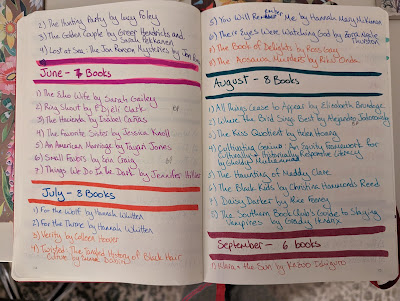Break was glorious and Vermont was relaxing and rejuvenating. I couldn't do the outdoor activities, just a little bit of walking around the village, but I could read. And I did -- a book a day. It was lovely.
And, weirdly, every single book I read from Monday on had an infertility and/or loss piece to it. Some tiny, some central.
Two in the middle, Love and Saffron by Kim Fay and The Book of Goose by Yuyumi Li, had characters who were childless not by choice but mainly by male factor infertility. It wasn't even remotely the biggest thing in either book (both lovely but very different).
Thick, a book of essays by Tressie McMillan Cottom, took me by surprise with an essay about the loss of her daughter at 20 weeks due to racism in the medical system. Elsewhere in the collection she mentions being single and childless and happy to live alone, which confuses people. She wrote about her loss and reasons for it and the horrific record of Black maternal and baby death our country, and it was one of 8 essays. (Highly recommend.)
But then, I chose to read a book that was entirely about infertility, and unintended pregnancy, and motherhood: Red Clocks by Leni Zumas. I have had this book on my radar for years, but then forgot about it until I saw it at my small independent bookstore, used. I don't think I could have read it and enjoyed it earlier (it came out in 2018). It is visceral, and raw.
The tagline on the back cover reads, "Five women, one question: WHAT IS A WOMAN FOR?"
You have "the biographer," a woman who is happily single, 41, and trying to get pregnant through IUI. Who is also writing a biography of a Faroese ice explorer who was lost to history because she had to publish through a man because massive sexism, but pushed through expectations to go out and study ice packs as a scientist.
You have "the daughter," a teenage girl who has to make choices when she faces pregnancy.
You have "the mender," an herbalist living like a hermit in the woods, providing natural gynecological care of all kinds.
And you have "the wife," a stay-at-home mom to two children she loves but who is facing a problematic marriage and identity crisis.
All of them live in Oregon, in a timeline where Roe v Wade has been struck down (before it actually was in real life), where abortion is illegal in all 50 states, where IVF is illegal because of a Personhood bill that considers embryo destruction murder, where adoption is about to be only for married couples due to the Every Child Needs Two Act, and where a Pink Wall exists between the U.S. and Canada where Canada will uphold U.S. law and send "terminators" back to be prosecuted in the name of "alliance."
I was worried at first that it was going to be trope-y, that it would have pitfalls. It totally didn't. And the only inaccuracy that I found to be mad about was calling an 8-celled embryo a blastocyst (um, no). Everything else was highly accurate. And the storylines of being a mother but having lost other identities, of not wanting to be a mother yet and having limited choices, of desperately wanting to be a mother but finding it difficult, and someone who wants to help women with various choices... they were lovely. They all played against each other and intertwined and showed how everyone makes assumptions and judges and can be blinded by wants. That there are no easy answers to anything. That what one person desires is another's worst nightmare, and it's all much more complicated and dire when the government decides instead of those who have the bodies in question. (I loved that one character called the old white men in D.C. who voted for all the laws "the walruses.")
I really, really loved it. It was beautifully written, although not something I would have been able to handle in the raw days. And it's speculative fiction, less futuristic than The Handmaid's Tale but chilling in how quickly things become true.
And the cover is a not-so-stealth origami-style vulva, which I find hilarious.
Want to read more #Microblog Mondays? Go here and enjoy!




